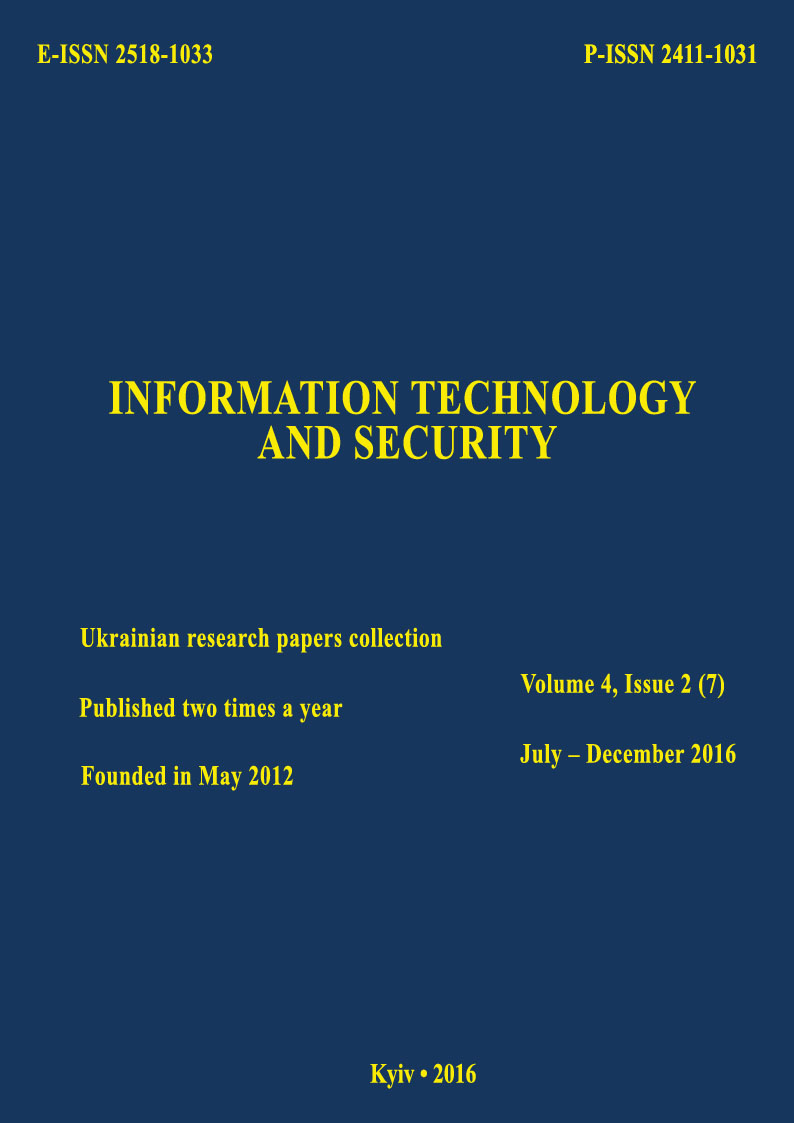Rationale method of prior diagnostic modules development of technical support modular prospective hardware for special communications means
DOI:
https://doi.org/10.20535/2411-1031.2016.4.2.110105Keywords:
Special communications, special communications means, technical support, modular type hardware technical support, objective function.Abstract
In the article, prospective of development and stages of design of technical support modular hardware for maintenance and repair of special communications means in the field conditions, which are based on the analysis of conditions of the material-technical base for repair of special communications means, are formulated. On the basis of an expert study ranking of special communications means, which is grounded on mass, reliability, and importance of the necessity of urgent development of specialized modules, is conducted and the necessity of development of prior specialised hardware modules is determined. The objective function of this hardware usage in peace and wartime is substantiated. In addition, the method of development of priority importance usage of specialized diagnostic modules according to the types of communications equipment applying a complex indicator, which takes into account the quantity, reliability and application of this equipment in the special communications system, is suggested. Using the method allows to determine the appropriateness of different operator's rooms in this particular case and to justify recommendations for the creation of priority specialized modules of perspective operator's rooms for technical providing of special communication. Recommendations on specialized modules is consist in to ensure maintenance of perspective operator's rooms for technical support with modules for the maintenance and repair of power stations, medium radio stations and secrecy system; the advisability of operator's rooms staffing with modules for service and repair low power stations, field cable and radio relay stations; in necessity of staffing of repairs of relevant specialized or universal operator's rooms in the absence of their modular type.
References
V. Ryzhakov, “ Perspective research directions of the technical ensuring military communications technology systems improvement”, Collected Works KMIGC, no. 1, pp. 136-139, 2001.
O. Mishchenko, “ Providing of repair military communication equipment by aggregation method ”, Collected Works of Military Institute of Telecommunications and Information of National technical university of Ukraine ”Kyiv polytechnic institute”, no. 2, pp. 68-70, 2002.
V. Pavlov, “ Classification of hardware technical support ”, Collected Works of Military Institute of Telecommunications and Information of National technical university of Ukraine ”Kyiv polytechnic institute”, no. 2, pp. 87-92, 2002.
O. Ivashchenko et al., Guidelines for technical support and AUV Armed Forces of Ukraine. Kyiv, Ukraine: Voienne vydavnytstvo, 2003.
V.P. Pavlov, “ Justification of recommendations on developing hardware of modular type technical providing ”, Collected Works of Military Institute of Telecommunications and Information of National technical university of Ukraine ”Kyiv polytechnic institute”, no. 4, pp. 93-97, 2003.
V. Ryzhakov, and L. Sakovych, “ Choosing a strategy for restoring the health of communication technology with accidental damage ”, Zviazok, no. 7, pp. 47-54, 2005.
L. Sakovych, and R. Bobro, “ Modeling the process of repair of communication equipment with emergency and combat damages ”, Kyiv, RK 0206U003223, 2006.
V. Romanenko, and L. Sakovych, “Model group search process defects during the repair of military communications technology”, Arms and military equipment, no. 4, pp. 49-54, 2014.
Requirements for maintainability of newly developed and modernized means of communication. Moskow, Voenizdat, 1982.
Government standard. GOST V 23068, Mobile repair army workshops. Test methods. Moskow, 1987.
Government standard. GOST V 22243, Мастерские подвижные ремонтные армейские. Общие технические требования. Moskow, 1990.
R.F. Iager, Fuzzy sets and possibility theory. Moskow, Russia: Radio i sviaz, 1986.
B. Herasymov, Design, management and processing of information based on fuzzy sets. Kyiv, Ukraine: Radioamator, 2000.
E. Venttsel, Probability theory. Moskow, Russia: Vysshaia shkola, 2002.
E. Venttsel, Probability theory. Moskow, Russia: Vysshaia shkola, 2002.
Downloads
Published
How to Cite
Issue
Section
License
Copyright (c) 2020 Collection "Information technology and security"

This work is licensed under a Creative Commons Attribution 4.0 International License.
The authors that are published in this collection, agree to the following terms:
- The authors reserve the right to authorship of their work and pass the collection right of first publication this work is licensed under the Creative Commons Attribution License, which allows others to freely distribute the published work with the obligatory reference to the authors of the original work and the first publication of the work in this collection.
- The authors have the right to conclude an agreement on exclusive distribution of the work in the form in which it was published this anthology (for example, to place the work in a digital repository institution or to publish in the structure of the monograph), provided that references to the first publication of the work in this collection.
- Policy of the journal allows and encourages the placement of authors on the Internet (for example, in storage facilities or on personal web sites) the manuscript of the work, prior to the submission of the manuscript to the editor, and during its editorial processing, as it contributes to productive scientific discussion and positive effect on the efficiency and dynamics of citations of published work (see The Effect of Open Access).

